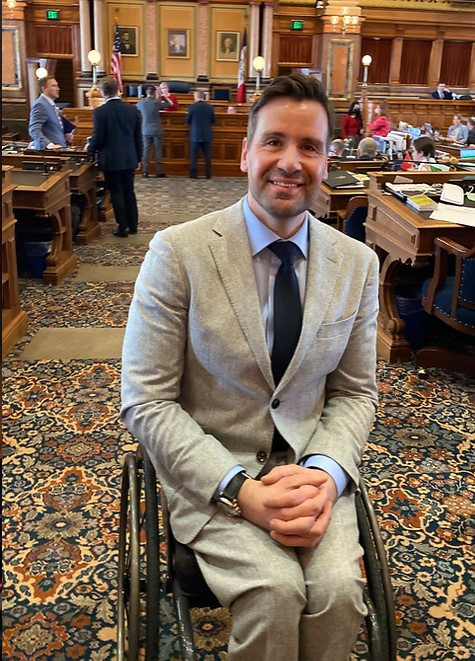Financial News
BetterCaths Coalition Assists Rep. Josh Turek in Designing Better Caths for Iowa Act to Remove Harmful Phthalate Chemical DEHP From Urological Catheters

Iowa Representative Josh Turek - (D)
Iowa legislative representative Josh Turek appears in a suit, sitting in his wheelchair on the Iowa House floor.
DES MOINES, Iowa, February 26, 2023 (Newswire.com) - In support of the disability community, Iowa State Representative Josh Turek (D-Iowa) has introduced the Better Caths for Iowa Act (H.F. 387) to review the use and reimbursement of certain catheters under the Medicaid program -- specifically urinary catheters made with the harmful chemical DEHP.
Born with Spina Bifida, Representative Turek is a four-time Paralympian who most recently brought home Gold from the 2020 Tokyo Paralympics. He is the first person who uses a wheelchair to be elected to the Iowa State Legislature.
"Bladder cancer took the life of Dale Ericksen, my wheelchair basketball coach at Southwestern Minnesota State University," Rep. Turek shares. "I introduced this bill to improve health equity for Iowans with disabilities. I encourage state and federal representatives, nationwide, to introduce similar legislation."
The Better Caths for Iowa Act is the first piece of legislation in the country that aims to lower the bladder cancer mortality rate for people whose lives depend on using urological catheters. It also protects Iowa Medicaid patients from daily exposure to the toxic chemical (DEHP) in some commonly-used urinary catheters.
The BetterCaths for Iowa Act places an immediate ban on Iowa Medicaid reimbursement of catheters that have known carcinogen warning labels. It also requires Iowa Medicaid to review the historical bladder cancer rate and correlating brands of catheters used by their patients.
BetterCaths, a grassroots volunteer organization of bladder cancer survivors who use catheters, disability advocates, and urological industry experts, assisted in drafting the bill's language and provided supporting clinical evidence.
Urinary catheters are often made from Polyvinyl Chloride (PVC), a chemical that is made into plastic.
The East Palestine chemical disaster was created by a chemical that makes PVC, when 38 cars of a Norfolk Southern freight train carrying hazardous materials derailed on February 2, 2023 in East Palestine, Ohio. Five of the 38 derailed train cars were carrying more than 115,000 gallons of vinyl chloride, according to the National Transportation Safety Board.
Phthalate chemicals like DEHP (Di(2-ethylhexyl)phthalate) make plastic and PVC products more flexible. A vast body of scientific evidence proves that DEHP causes reproductive and endocrine health issues, and cancer, in humans.
"People who depend on urological catheters to stay alive should not have to worry about cancer-causing chemicals in these invasive medical devices," says Representative Turek.
"I'm particularly concerned about DEHP's association with cancer because the bladder cancer rate for people who use urinary catheters is four times the national average. Patients who have indwelling catheters are diagnosed with bladder cancer at 16-28 times that of the general population. Even worse, people who use catheters die eight times more often from bladder cancer than those who do not cath," he adds.
Iowans who depend on urological catheters for bladder function may have one of the following medical conditions: prostate cancer, Parkinson's disease, spina bifida, spinal cord injury, traumatic brain injury, multiple sclerosis, stroke, dementia, transverse myelitis and cauda equina.
"I am honored to build upon the legacy of the Americans with Disabilities Act, which originated in Iowa, by introducing the Better Caths for Iowans Act," Turek adds. "This is a common sense, non-partisan bill."
Bladder cancer is the most expensive form of cancer to treat. This bill also aims to lower Iowa Medicaid expenditures by reducing the likelihood of bladder cancer among Medicaid patients who use catheters.
Scientific research has shown that phthalates like DEHP interfere with the natural functions of the hormone system, which can cause health problems - particularly cancer and damage to the reproductive system. In men, hormone damage caused by DEHP can also lead to reproductive sterility.
DEHP exposure has also been linked to learning and behavior problems in children and insulin resistance in adolescents and adults. DEHP exposure has also been connected to children's respiratory and immune system issues, such as asthma and allergies.
This bill is part of Representative Turek's ongoing effort to improve healthcare for every Iowan and health equity for people with disabilities while promoting fiscally and morally responsible healthcare reform policies.
In 2022, more than 140 urinary catheter users responded to a BetterCaths research survey that found:
- 90% of respondents were not told by their doctor or catheter supplier if the catheter they presently use has a known carcinogen warning label.
- 90% of survey respondents did not have the opportunity to choose alternatives to catheters with carcinogen warning labels.
Most people also don't realize what the DEHP exposure level is for someone who uses urinary catheters made with this toxic chemical.
- If you use an intermittent catheter 6 times per day, every day (365 days/yr), for 20 years, you will put that DEHP catheter inside your body 43,800 times.
- If you use an indwelling catheter 24 hours per day, every day (365 days/yr), for 20 years, you will have that DEHP catheter inside your body on a constant basis for 7,300 days.
Representative Turek's bill has broad support from health advocacy organizations, including the Iowa Developmental Disabilities Council, the Iowa Chapter of the United Spinal Association, Iowa Spina Bifida Association, and Spinal Cord Peer Support USA (the nation's largest online support community for people who have SCI/D).
Representatives from these supporting organizations, and the BetterCaths health education team, will give statements in support of the Better Caths for Iowa Act when the bill is reviewed by a Iowa House health subcommittee on Tuesday, February 28, 2023.
Read H.F. 387, the Better Caths for Iowa Act, at: https://www.legis.iowa.gov/publications/search/document?fq=id:1369604&q=387
Learn more about the issue and supporting clinical evidence at www.BetterCaths.com.
###
Contact Information:Lisa Wells
BetterCaths Health Educator
lisadianewells@hotmail.com
Gina Schuh, JD
BetterCaths Health Educator
ginanschuh@gmail.com
Original Source: BetterCaths Coalition Assists Rep. Josh Turek in Designing Better Caths for Iowa Act to Remove Harmful Phthalate Chemical DEHP From Urological Catheters
More News
View More




Recent Quotes
View MoreQuotes delayed at least 20 minutes.
By accessing this page, you agree to the Privacy Policy and Terms Of Service.



